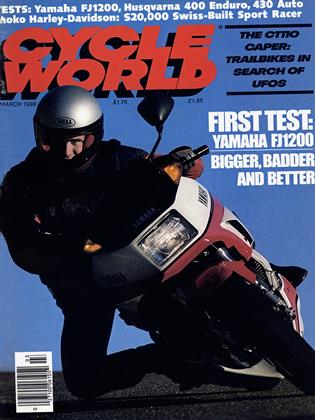1987 CAGIVA/DUCATI 750 paso
PREVIEW
NOT TO WOORY: SPORTBIKES ARE ALIVE AND WELL IN VARES
DUCATI LOVERS NEED NOT HAVE worried. Ever since Cagiva acquired that Bologna-based manufacturer of desmo engines and uncompromised sportbikes, Ducati loyalists have been concerned that the character of Cagiva-Ducati motorcycles would change, degenerating into the less sporting, even the ordinary.
Cagiva addressed those doubts at this year’s Milan show with the unveiling of the 750 Paso. Named after the late Italian roadrace hero Renzo Pasolini (who rode for Aermacchi, Cagiva’s corporate ancestor), the Paso uses a much-upgraded Ducati 750 Pantah V-Twin engine carried in an entirely new chassis, all enclosed in the most aerodynamic bodywork ever to grace a streetbike.
Engine modifications are designed to boost power while eliminating some long-standing consumer nitpicks. Bigger valves and revised cam timing pick the power up to 75 bhp at 9000 rpm, and throttle effort at long last is reduced to Japanese-bike levels by a push-pull linkage that allows the Dell’Orto carbs to use light return springs. A new, Japanese-made ignition gives a more-gradual spark-advance curve, smoothing power flow off idle; the current Pantah-engined bikes can be abrupt at low rpm as the timing suddenly advances 20 degrees.
But the engine changes are minor compared to those in the the chassis, which bears little resemblance to any Ducati, or even the original prototype Cagiva-Ducati Bimota built under commission (shown in the September, 1985, Cycle World); instead, the Paso is completely a product of Massimo Tamburini, former Bimota chief designer, now head of Cagiva’s design studio. He sculpted the Paso around a set of very-low-profile, 16inch Pirelli radiais. Because these tires are very short, they allow Ducati’s long V-Twin to be packaged close to the front of a long, low and narrow motorcycle, giving the forward weight bias needed for best handling. At 57.2 inches, the wheelbase helps to slow down the quick steering that could result from such a small front tire; those who have ridden the
prototype report that the Paso steers lightly with excellent stability. Handling should also be aided by the low overall weight: a claimed 373 pounds dry. Both front and rear suspensions use the best available components (a Marzocchi M1 fork in front, an Ohlins single shock in back), and both wheels can travel about 5.5 inches, enough for good ride quality but not so much as to compromise handling.
Many such balances have been sought with the Paso. The bodywork gives low drag with good engine cooling (twin oil coolers can be found embedded in the fairing sides), but the riding position is more reminiscent of the Interceptor’s or FJ1 100’s than that of a racebike or of an old Ducati 900SS, and that may mean that chiropractors won’t have much business from Paso owners. Even the windowless fairing design is intentional; the solid top of the fairing is low enough to look over while in a full tuck, and is stronger and lighter than a clear plastic bubble would be. Maintenance was considered in the design, as well: the rectangular-tube frame gives good engine access after the body panels are removed. In the end, the Paso seems a well-conceived, professional design offering plenty of flash and performance, but still meeting real-world needs.
A word of caution, however: The Paso shown in these photographs is very much a prototype, a showbike that we shanghaied for a few hours while it was in the U.S. during a Pirelli radial tire introduction. Production of Pasos isn’t scheduled to begin until April, 1986, and they won’t be available in the U.S. until at least the fall of 1986. Some details, such as the turn signals, will certainly have to change on the production model, and there is even talk of giving American Pasos a different name. Cagiva anticipates a price in the upper $4000 range, but that, too, is subject to the vagaries of manufacturing and exchange rates.
Still, however it may evolve during the next few months, the Paso is already strong evidence that there is nothing ordinary or unsporting about Cagiva motorcycles. EB
 View Full Issue
View Full Issue











